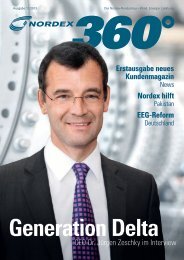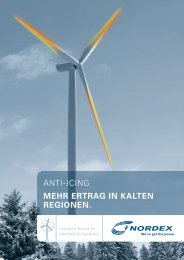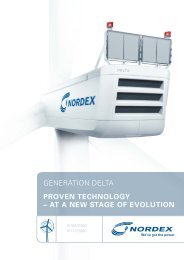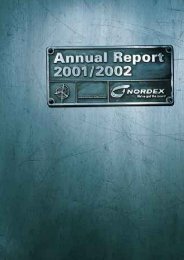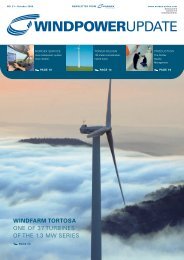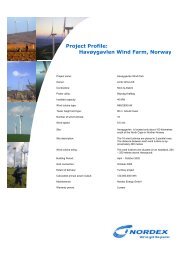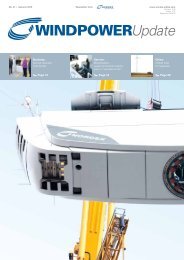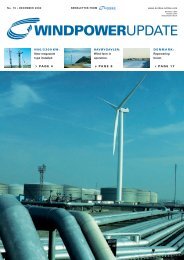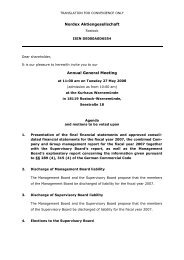OFFERING MEMORANDUM Global Offering of up to ... - Nordex
OFFERING MEMORANDUM Global Offering of up to ... - Nordex
OFFERING MEMORANDUM Global Offering of up to ... - Nordex
Create successful ePaper yourself
Turn your PDF publications into a flip-book with our unique Google optimized e-Paper software.
In <strong>to</strong>tal, the average pro forma income tax burden during the period under review for the <strong>Nordex</strong> Gro<strong>up</strong><br />
was approximately 37%.<br />
Net income<br />
Net income after consolidation increased by approximately 408% from EUR 1.6 million in fiscal year<br />
1997/1998 <strong>to</strong> EUR 6.53 million in fiscal year 1998/1999, and decreased by approximately 1% <strong>to</strong> EUR<br />
6.43 million in fiscal year 1999/2000 due primarily <strong>to</strong> the negative net financial result.<br />
Liquidity<br />
The following table sets forth the development <strong>of</strong> the Gro<strong>up</strong>’s liquidity during the periods indicated:<br />
Fiscal years<br />
1999/2000 1998/1999 1997/1998<br />
EUR thousand<br />
Cash flow from operating activities -44,886 18,868 -379<br />
Cash flow from investing activities -12,090 -10,497 -1,947<br />
Cash flow from financing activities -7,913 -4,104 -1,290<br />
Change in cash and cash equivalents -64,889 4,266 -3,615<br />
Cash and cash equivalents at beginning <strong>of</strong> period 2,407 -1,859 1,756<br />
Cash and cash equivalents at end <strong>of</strong> period -62,482 2,407 -1,860<br />
there<strong>of</strong>:<br />
Cash in hand and at bank 2,634 371 588<br />
Intercompany clearing account credit/(debit) balances -64,936 2,095 -2,447<br />
Current liabilities due <strong>to</strong> banks -180 -59 0<br />
-62,482 2,407 -1,859<br />
The fluctuations in cash flow from operating activities resulted from strong increases in sales during<br />
the period under review. In particular, the investment backlog in fiscal year 1999/2000 that was caused<br />
by the uncertainty surrounding the Gesetz über den Vorrang erneuerbarer Energien (Renewable Energy<br />
Directive) co<strong>up</strong>led with associated planning difficulties, led <strong>to</strong> incoming orders being delayed until the<br />
middle <strong>of</strong> fiscal year 1999/2000. This contributed <strong>to</strong> a high level <strong>of</strong> receivables on the balance sheet<br />
date at September 30, 2000, the unusually high level <strong>of</strong> receivables at the end <strong>of</strong> fiscal year 1999/2000<br />
was primarily due <strong>to</strong> the date <strong>of</strong> the balance sheet, and returned <strong>to</strong> pre-September 30, 2000 levels in<br />
the first quarter <strong>of</strong> fiscal year 2000/2001.<br />
The negative cash flow from investing activities in fiscal year 1999/2000 was due primarily <strong>to</strong> capital<br />
expenditures for property, plant and equipment and intangibles. The major contributing fac<strong>to</strong>rs were<br />
the capitalization <strong>of</strong> development costs, pro<strong>to</strong>types and s<strong>of</strong>tware required in connection with the<br />
Gro<strong>up</strong>’s conversion <strong>to</strong> the SAP R3 cost accounting program. In addition, in fiscal years 1998/1999 and<br />
1999/2000, the <strong>Nordex</strong> Gro<strong>up</strong> increasingly invested in its production facilities in Ros<strong>to</strong>ck.<br />
The main contributing fac<strong>to</strong>rs <strong>to</strong> the negative cash flow from financing activities in fiscal year 1999/<br />
2000 were pr<strong>of</strong>it transfers <strong>to</strong> shareholders resulting from pr<strong>of</strong>it and loss transfer agreements which<br />
were still in force at that time, and which placed a burden on the Company’s financial position. Prior <strong>to</strong><br />
fiscal year 1999/2000, almost all <strong>of</strong> the overall requirement for cash and cash equivalents were<br />
financed by the Babcock Borsig Gro<strong>up</strong> by way <strong>of</strong> the inter-company clearing account.<br />
In the first year following the Company’s <strong>Offering</strong>, a portion <strong>of</strong> earnings will initially be used <strong>to</strong> set <strong>up</strong><br />
statu<strong>to</strong>ry reserves, and the Company’s positive future cash flow will be used <strong>to</strong> meet operating<br />
financing requirements. <strong>Nordex</strong> does not plan <strong>to</strong> pay any dividends in the fiscal years following the<br />
<strong>Offering</strong>. Part <strong>of</strong> the net proceeds <strong>of</strong> the <strong>Offering</strong> will be used, among other things, <strong>to</strong> repay the<br />
Gro<strong>up</strong>’s liabilities <strong>to</strong> the Babcock Borsig Gro<strong>up</strong>, which will improve the Gro<strong>up</strong>’s negative net financial<br />
result (see ‘‘The <strong>Offering</strong> — Use <strong>of</strong> Proceeds’’).<br />
93



